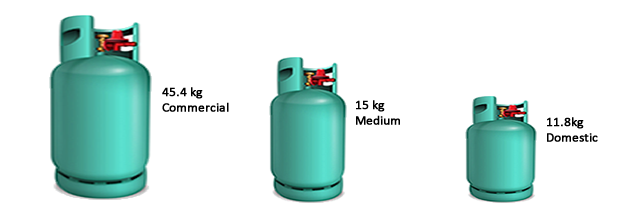LPG properties
- Flammable, pressurised gas obtained during the processing of crude oil
- Colourless and odourless. An odourising agent is added before distribution to give its characteristic smell.
- Half as heavy as water when in liquid form. It will float on water before vaporising.
- Easily liquefied by pressure, taking up only around 1/250th of its gaseous volume. This means that a large amount of LPG can be stored in a small place.
- LPG is composed of either propane or butane.
- Commercial propane is predominantly an outdoor fuel, commercial butane is predominantly an indoor fuel.
- We are selling three types of industry standard cylinders:

LPG hazards
- LPG is approximately twice as heavy as air when in gas form and will tend to sink to the lowest possible level and may accumulate in cellars, pits, drains etc.
- LPG in liquid form can cause severe cold burns to the skin owing to its rapid vaporisation. Vaporisation can cool equipment so that it may be cold enough to cause cold burns.
- LPG forms a flammable mixture with air in concentrations of between 2% and 10%. It can, therefore, be a fire and explosion hazard if stored or used incorrectly.
- Vapour/air mixtures arising from leakages may be ignited some distance from the point of escape and the flame can travel back to the source of the leak.
- A vessel that has contained LPG is nominally empty but may still contain LPG vapour and be potentially dangerous. Therefore treat all LPG vessels as if they were full.
Cylinder handling
- Do not store or use cylinders in the horizontal position. A leak could be very serious and liquid could enter gas lines.
- Always display safety and operating notices prominently.
- Trace leaks using liquid detergent solution, NEVER a naked flame.
- Never store or use below ground level, as any leakage will collect at low levels. Storage should be well ventilated, preferably outdoors.
- Propane cylinders should not be used indoors for domestic appliances, due to their higher pressure.
In case of emergency
- Open all doors and windows to ventilate the property.
- Do not turn on/off any electrical switches.
- Extinguish all naked flames, do not smoke, strike matches or do anything which could cause ignition.
- If there are any electrical security entry phones/locks, please open doors manually.
Emergency number
1122
1122

